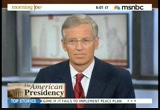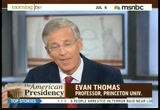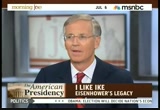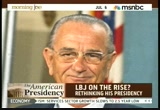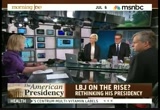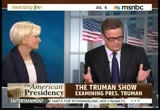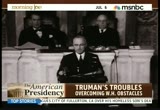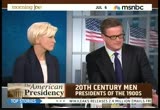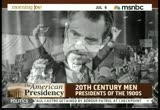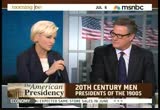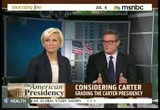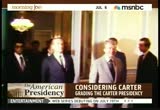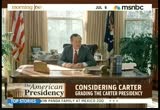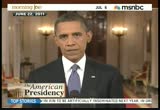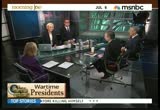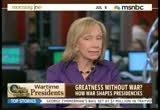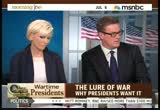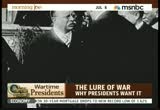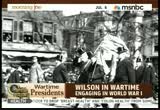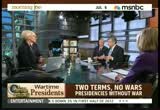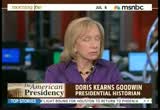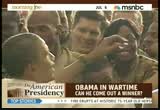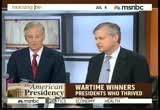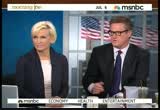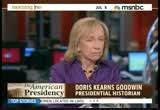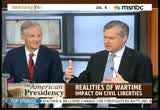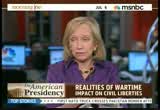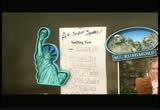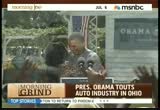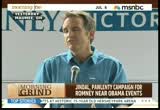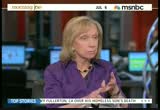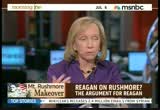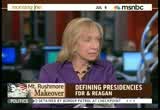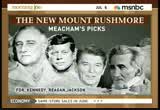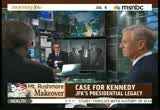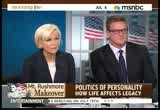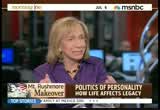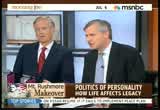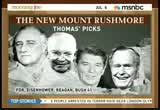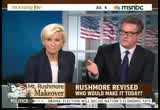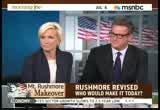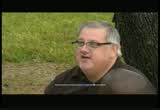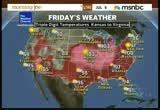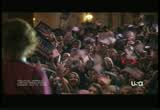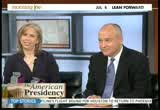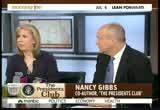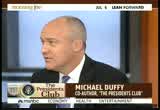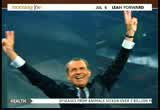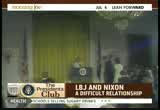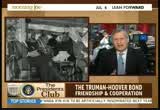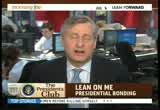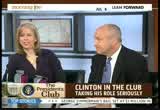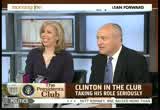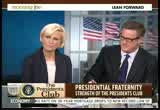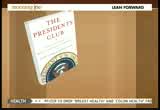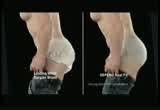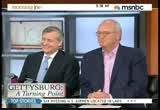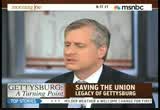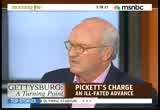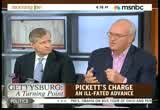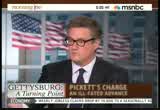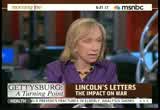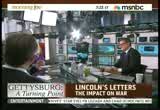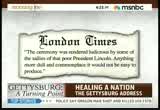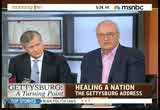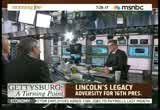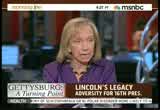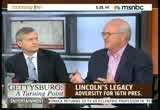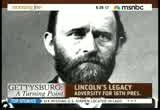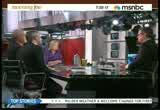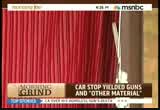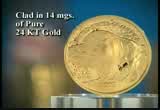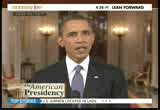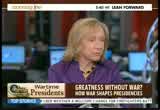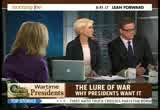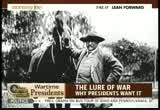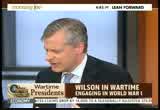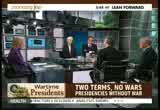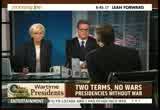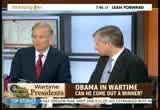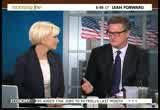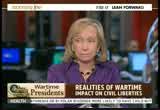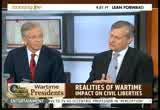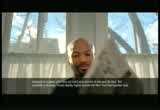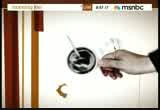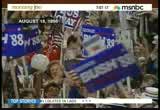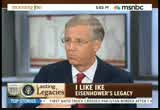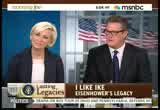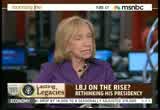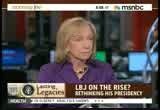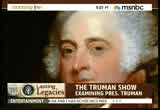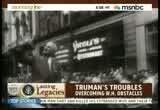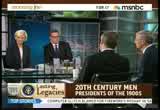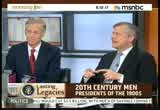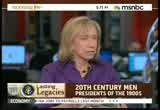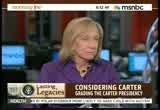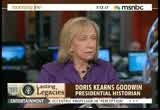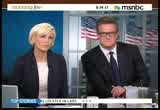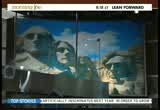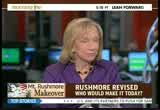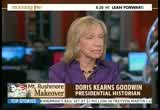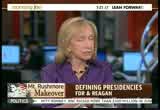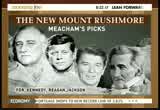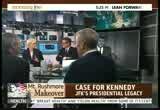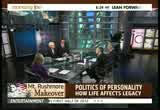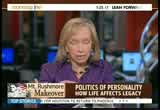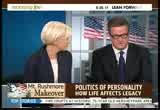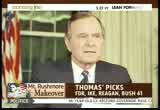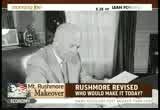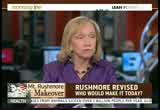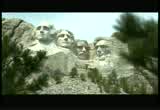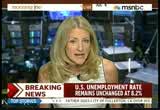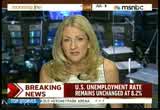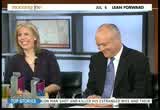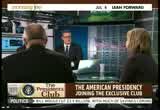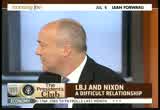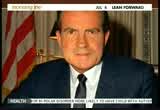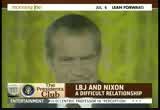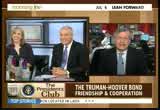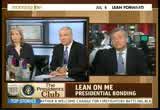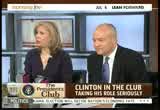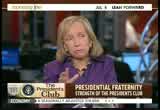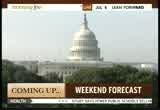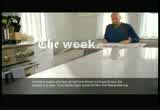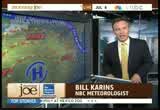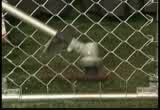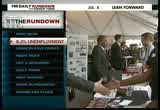tv Morning Joe MSNBC July 6, 2012 6:00am-9:00am EDT
6:00 am
author of an upcoming biography about eisenhower, evan thomas. great to have you all on board this morning. >> what a great way to start it. dwight eisenhower, you always see predents rise, you see presidents fall, and over the past four, five, six, seven years i have found myself going back and reading ambrose's eisenhower over and over again. talk about -- let's start with eisenhower right now, my favorite president. it may change after i read your biography. >> exactly. >> and i find out that he would actually kick dogs instead of go golf. but talk about a guy like eisenhower who was just derided, dull, and worthless and you look back and say my god,hat he did over eight years, pretty unbelievable. >> one of the great things of all time was the kennedys on eisenhower. to make jack kennedy look young and vibrant you had to make
6:01 am
eisenhower look old and dull. that stuck. what people didn't realize was that with a hidden hand, as a professor named fred greenstein once said he was doing a lot, really keeping us out of war. you don't credit for things that don't happen, but he for eight years, got us out -- we were in korea when he got in, got us out by bluffing, basically. >> brinksmanship, threatening to use the bomb and other things. he spent the next eight years at a scary, dangerous time. the cold war is getting going, nuclear weapons are new things, there are communist threats all over the place. he bluffed our way through eight years. didn't lose any soldiers, didn't get into any wars, stayed out of vietnam. >> the economy exploded, created the interstate system, invested in science, he did -- >> balanced the budget while doing it and there was a huge pressure on him to spend more on defense and he was the one guy who understood how to stop that. used to talk about those boys at the pentagon. i know them. i understand them.
6:02 am
>> he knew those boys at the pentagon. doris, here's a great example of lyndon johnson, the man you knew so well, lyndon johnson wouldn't go out holding press conferences talking about eisenhower. this segment is not about ike, but it is -- we're just talking about presidents who rise and presidents who fall. eisenhower is on his way up right now. >> legacies. >> but you had, of course, lbj constantly drawing on johnson's -- on eisenhower's wisdom. >> and the great thing about eisenhower he was so popular among the people. the great song ♪ i like ike because ike is easy to like ♪ no one else has a great song. i think lbj is rising too and i think it's about time he does. he left under a cloud, the scar in vietnam, so painful at the time he left. and the combination now of some distance from the war, the recognition that what he accomplished domestically we
6:03 am
cannot take for granted. three great civil rights law, medica medicare, aid to education, his vibrancy that shows in the crazy tapes. listen to those tapes, he's back alive again swearing and being the most fascinating person i've ever met in public life. and carole's books are helping because they create this giant character. he deserves it. >> giant situations in front of him, the way he came in as well as the way he left. >> giant character and also -- >> dark clouds. >> you were there closely with him, but also so complicated. our relationships with our presidents are so personal, and the fact is he accomplished remarkable things politically and yet, you never get through a couple of pages of carole's books where you go, oh, this was not a good guy. >> i don't think that's not true. i disagree that he's not a goo guy. he's a strange guy. i mean there's not many presidents that -- >> they're all strange. >> take you into the bathroom
6:04 am
while they're going to the bathroom and talking to them on the toilet. >> not enough. >> not enough of that. not many presidents when talks to you violates the normal human space between people so your head is against his chest. but not many presidents who could tell stories like he could, who could mimic anybody, who had the use of power and wanted to do it to do good for people. >> let's talk about another president, jon meacham, 20th century, who when he died, early 1970s, lot of people didn't think much of him, harry truman left, with a 21% approval rating, but you look at how he came in april of '45, the decisions he made in '46, especially in '47, the marshall plan, i mean my god, what that guy did, even my family, good southern roosevelt democrats were mocking him every step of the way. he created the world. he created the world that we
6:05 am
live in, at least the framework of it internationally. >> it's remarkable how many presidents we now look back on as iconic, examples for good, who left barely a step ahead of the sheriff. >> just broken. >> washington barely ran for a second term because he was so tired of being criticized. adams was defeated. jefferson left under a huge cloud. the truman is the moderate example of the -- every president who gets in trouble wants to be truman. because it means history vindicates you. >> right. >> one of the things that happened was, watergate and it took 30 years, maybe a little less, but truman, remember that one-man show -- >> merle miller one. >> plain speaking but then a one-man show that went on as watergate was breaking. truman had the great fortune of
6:06 am
having disliked richard nixon early and had a lot of quotations about him. and he suddenly, as faith in the public sector is falling in the early '70s, all the examples you're talking about with truman are looking better and better. a president who, as evan wrote about the wise man, he was the popular embodiment of an american willingness to project power and to stand guard over a really complicated dark world. >> during that mid -- during the mid '70s also, even chicago, the band chicago had a song. ♪ america is calling harry truman, harry you know what to do ♪ >> it does go back -- >> are you going to sing together? >> going to have a whole show on songs. >> let's talk about the presidency in the modern era, starting with jfk. jfk, of course, assassinated, that's how he leaves office.
6:07 am
lbj, a completely distraught, broken man, which i still am haunted by the scene that doris paints, as he's there, begging this young woman to just come work with him. nix nixon, of course, leaves broken after that. ford leaves broken. choked up. the morning after his wife has to speak for him. jimmy carter leaves broken. ronald reagan. let's go -- i mean every single president, george h.w. bush. >> it's a brutal job. they all leave broken. >> i mean look at obama. he's not broken but his hair is graying. they visibly age. >> bill clinton is not broken. >> oh, wait, i forget. bill clinton is not broken. you know why bill clinton is not broken because he refused to leave. >> he won't leave. >> bill clinton still in the hangar, four months later. >> they're broken when they leave but rehabilitate themselves. even nixon, you couldn't leave more broken than nixon but he becomes this age of saddle river, having journalists out to
6:08 am
dinner, rewriting history books. even nixon can come back. there is life after the presidency if you handle yourself. >> history is like one of the reasons this is all so much fun and i think so important ultimately, is remember the way the founders described i think washington described the senate as the saucer in which -- >> the tea cooled. >> the tea cooled. >>hat' what history. it takes our friend michael, says a rule, you can't write about a president in full until 25 years after they leave office. again and again that's true. >> let me ask you this, mika, by the way, mika, you talked about a time that richard nixon came over to your house and you were a young woman -- >> this happened with me and joe all the time. >> yeah. ex-presidents would always come over. came over to talk to your dad and you just talked about how broken and how sad -- >> might have just been the timing but he was on a seat on our porch and it was sunset and it's just a chair in the middle
6:09 am
of the porch and he was just sitting there. >> slumped over, beaten. >> waiting for my parents to come out. he had a lot of physical challenges as well, but i just -- i couldn't take my eyes off him. >> doris -- >> i felt the same thing with lbj. he used to walk me down to the place he was born, the birth house and look to see how many license plates were there, hoping people were visiting it. at the library he wanted more people to be at his library than jfk's library. get them coffee, get them in there, anything. >> doris, let's talk about another president who has taken abusend i think too often he gets in his own way, we talked about presidents who -- but jimmy carter has become our herbert hoover. herbert hoover, a man who lived a very long time, but as people look back on herbert hoover's life and we have some authors coming up that have written about the president's club, you
6:10 am
find the great contributions that herbert hoover made to america and to government after he left, but jimmy carter, jimmy carter really, a scene out of "gone with the wind" frankly my dear, he doesn't give a dam about what anybody thinks about him. he doesn't play the game. i'm wondering, will jimmy carter get his team when people look back and say, camp david, and energy policy, helping america recover from the scars of watergate? >> i think the vision that he had for where our country should go, one of the things you measure a president by, is where does he want to take the ship of state. and in terms of energy and in terms of the post-watergate, noncorruption he did have a good vision. the question was, you got to be able to bring congress and the people with you to the port where you want to go. and he just didn't have those political skills. i don't think he was relaxed around congressmen. i remember tip o'neill once said that he had seen ronald reagan more in the first six months of reagan's term than he had seen
6:11 am
jimmy carter in the whole four years. i think if they have a post-presidency, when a biographer write the about them it does shadow in a positive way how they think atheife and he certainly puts such energy into this post-presidency. he's had ups and downs in it. the thing with hoover is so moving, too, because he evidently started crying when truman wanted him back to do the government. nobody has asked me to do anything for so long and here are these great people we'll be talking about that, but it's just -- i think carter will get more. do they all get more do. biographers have to come along and write something, and they don't want to write the same things. >> they get more due if they're willing to risk their presidency. carter was willing to make decisions even if he's not going to get re-elected we have to do this at camp david, the peace process, a lot of things. harry truman, same thing. he made decisions knowing it was going to hurt him politically. george bush, i mean, he makes
6:12 am
that deal in 1990, i guess it was. >> right. >> you know, he raises taxes. he knows in real time, that could be the end of his re-election, but he does it anyways. and historians rightly look at those presidents and they say hey, here's somebody who was willing to do the right thing. >> jon meacham, doris kearns goodwin, thank you so much. ahead a question we have for everybody, there is a unifying quality for all war time presidents? our in-depth look at the american presidency continues on this july 4th week. [ male announcer ] let's say you need to take care of legal matters.
6:13 am
6:14 am
and combined it with modern technology. together you get quality services on your terms, with total customer support. legalzoom documents have been accepted in all 50 states, and they're backed by a 100% satisfaction guarantee. so go to legalzoom.com today and see for yourself. it's law that just makes sense.
6:15 am
6:16 am
of war, the costs that's been paid by the nearly 4500 americans who have given their lives in iraq and the over 1500 who have done so in afghanistan. men and women who will not live to enjoy the freedom that they defended. thousands more have been wounded. some have lost limbs on the battlefield and others still battle the demons that have followed them home. yet tonight, we take comfort in knowing that the tide of war is rece receding. fewer of our sons and daughters are serving in harm's way. we've ended our combat mission in iraq with 100,000 american troops already out of that country, and even as there will be dark days ahead in afghanistan, the light of the secure peace can be seen in the distance. these long wars will come to a responsible end. >> that was president obama last year announcing his plan for a troop draw down in afghanistan
6:17 am
by presiding over the war in afghanistan, president obama adds his name to the list of american war time presidents. our all star panel is back with a look at these war time presidents and how they responded to times of national security crises. executive editor of random house and pulitzer prize winning historian jon meacham, bestle issing historian doris concerns goodw goodwin. author of an upcoming biography about eisenhower, evan thomas. >> doris, obviously lbj, vote fam, one of the great -- vietnam, one of the great examples of how a war can shatter a presidency. >> or on the other hand a war provides a president with a chance to summon the nation to a great cause and a lot of our presidents have felt without a war, they'll never be great. so that -- theodore roosevelt is a few one of the near great
6:18 am
presidents because of his personality he didn't have a war. when lincoln was a young man he lamented the fact, the republic had been formed and his generation had no challenge. what's going to be left for us, modest ambitions, maybe a congress, presidency without purpose and then the civil war comes along. i remember jfk saying at one time, could i be a great -- i don't remember but said to have said can i be a great president without a war. clinton wondered the same thing. a war can undo you as with lbj or offer you that chance to make the country come together. certain sense, bush had that chance at 9/11 could he have summoned the country to greatness at that point which did not happen. >> and evan, here's another ample of dwit eisenhower, possibly not getting his due, because he avoided war and one of the most extraordinary moments i think of his presidency, was the suez crisis where everybody was ready to go
6:19 am
to war and ike said, sit down. you're not going. >> war is a great temptation. >> yeah. >> particularly if you've never fought one yourself. >> right. >> and you know, we joke about chicken hawks butctually this is a real problem. men need to show their manhood and arguably george w. bush had something to prove to the nation and to himself and to his father, when he evaded iraq. i mean you don't have to get too heavy into the psycho babl to see the draw and lure of war men ve been drawn by. eisenhower had won world war ii, conquered, liberated europe. teddy roosevelt an interesting example. got war out of his system by charging up san juan hills. he was the ultimate war lover. he was almost crazy about it. but he got it out of his system by doing it himself. when he became president he was not -- we talked about speak
6:20 am
softly but carry a big stick, he believed in power but he didn't rush. he was not des trait praits to rush into a war because he proved himself. >> let's talk about woodrow wilson and world war i. how did he respond to world war i? >> slowly. and moved toward engagement, involvement, in a way that was driven by a high-minded ideology that america having preserved itself and he was a conflicted southerner, that's redundant. >> yes. >> sometimes. >> that is. >> as you know. >> i don't have any idea about that. but, that the civil war had ratified the nation and that the country had a role to play in, as he put it, making the world safe for democracy, believing that free markets and free nations would leeb lead to a
6:21 am
more just and peaceful world. a vision fdr fundamentally shaped by wilson shared, and much truth to it, but, you know, only the -- i think it's herman woke who said only the dead have seen the end of war that we see popularized at. >> i actually came up with it. >> [ inaudible ]. i think my sense of presidents and war is that there is this interesting category of two-term presidents who have been faced with the temptation, as evan talks about, and haven't done it. and they don't get as much credit and i can tell you one president who's somewhat north of here will talk about this if you ever ask him as a two-term president who had conflicts but managed them well, bill clinton was like this, grant was like
6:22 am
this, thomas jefferson, eisenhower. these were men who avoided -- managed to avoid total conflict and because biographers, historians find the clarity and the drama of war so understandably tempting in a narrative sense, we write about war presidents. andrew jackson was like this. jackson the great warrior, wanted to shoot his own vice president, the only other person was john mccain, wanted to, you know -- probably because he had fought he knew it would be tough and he wanted to hold restraint. i think that what you have historically, unfortunately, great war presidents are, guess what, the presidents who won. >> yeah. >> not a whole hell of a lot more complicated. >> what makes fdr even more special, not only did he win the war which had to be won to save
6:23 am
western civilization, america came out a stronger country after the war. that doesn't always happen in wars. because of his policies towards business, brings in the business guys to run the productive agencies, the bill of rights, we emerged a middle class, much stronger, more just than before. he doesn't get as much credit for that because he won the war, but he won the peace. >> which leads us to what we see today. and what is coming out of the wars that we're at today. obviously president obama's history, his story is not over yet, but evan, you were talking about presidents driven by a high-minded ideology, what is president obama's as he tries to draw down and yet goes in with these drone strikes? >> he just wants to get out. i mean, all this talk about nation building and helping afghanistan become a real country, they're not talking about that now. they just want out. they don't want to have al qaeda there. >> these won't be won? >> there's no such thing in modern wars. >> but in history, you all are
6:24 am
talking about how important it is to win. >> modern wars. one problem with politicians define war, politicians believe you can compromise and have half measures. war is often an all or nothing proposition. eisenhower understood this. an all or nothing guy. go in all the way to win. politicians, lbj, you know, maybe there's a half a war we can have, a limited war we can have. >> a different day. >> this is so important. >> could we invade the fall kans? the british are protesting. that's a nice little war. >> we could do that. >> a splendid little war. >> i've been proposing a full-scale invasion of canada for some time. >> you have. >> all the oil reserves, it would be wonderful. >> prescription drugs. >> invade grenada a war he knew he was going to win. >> meacham, your thought was? >> great war time presidents are ones for whom war is total. and they are able to inspire and move a democracy as doris talks
6:25 am
about roosevelt or lincoln and small wars tend not to work out very well for democracies with one exception -- maybe others but one comes to mind -- which is the 1990/ '91 war in the gulf which george h.w. bush treated as a full-scale war. but then limited all the way, all or nothing, 500,000 men, but when it was over it was over. no creep, no wars. eisenhower understood war is a mutating monster. presidents who think they can control it are kidding themselves. >> what you're talking about is what colin powell talked about after that war and it's the powell doctrine, you go in with everything, you win, and you bring them home. if you don't -- >> or shouldn't go in the first place. not going to be willing to make that commitment. >> let's talk, doris, also, about the dirtier side of war as it comes to presidential legacies. wars have a way of having
6:26 am
preside presidents, ev our most revered presidents, stomping on civil liberties. we could start in 179 with the acts, we can talk about lincoln's suspending habeas corpus, we can talk about what woodrow wilson did in wor war i toward german americans. of course roosevelt infamously with the internment camps. we can take it all the way through george w. bush and gitmo and barack obama beating his chest and wearing sack cloth and ashes through 2008 and then as he's sworn in, go where are all the guys, i need -- there's a very dark side to this warfare and presidents aren't really good. >> and the saddest thing is the excuse always is that necessity compels somehow the violation of civil libertiesp even lincoln would argue i have to get those troops to washington. if i didn't the union wouldn't
6:27 am
have stayed. fdr is told somehow that the japanese-americans will be coming in from california to detroit to take over the country. but as thurgood marshall, the supreme court justice once said, those are the moments when civil liberties matter the most and you have to be careful. all those presidents suffer in history. eleanor roosevelt said about the incarceration of the japanese-americans and fdr's failure to bring more jewish refugees into the country before hitler closed the door forever those were his scars. i think lincoln if he came back now would know his scar he wished he hadn't had to do the habeas corpus. usually you don't have to do those things but this is your point, war gross on itself and you do everything you need to. it's a sad, dark chapter. >> the human element, jefferson used this when he talked about buying louisiana which was unconstitutional. and he was -- >> details, details. >> for constitutional amendment before he was against it. he was going to back the amendment to the constitution to
6:28 am
buy the louisiana purchase, then he got a letter saying napoleon was rethinking this and suddenly well, we don't need to worry about the constitution. he used a very interesting metaphor, he said, i am acting to the country as a guard woon to a war -- guardian would to a ward. i am doing something for the good of the ward that i wanted to do for their long-term future even if in the short term it appears to not have been according to the strict line of the law. i think all of these men so far, when they get behind the desk, get that ultimate responsibility, they take this, they have this sense that the whole weight of the world is on their shoulders and the line between executing that responsibility well and falling into self-pity and a kind of sol lip sism is a fine line. >> especially the weight of the life of the soldiers which they
6:29 am
take personally. if they think they're doing something that helps those soldiers to be in less danger, even if it violates the constitution that's how they rationalize it in their mind, i guess. >> jon meacham, doris kearns goodwin thank you so much. ahead the new mount rush more, what faces would our historians add to the mountain if the monument was carved today. our special on the american presidency continues thoday. ♪
6:30 am
[ male announcer ] it started long ago. the joy of giving something everything you've got. it takes passion. and it's not letting up anytime soon. at unitedhealthcare insurance company, we understand that commitmen and always have. so does aarp, an organization serving the needs of americans 50 and over for generations. so it's no surprise millions have chosen an aarp medicare supplement insurance plan, insured by unitedhealthcare insurance company. like all standardized medicare supplement plans, they help cover some of the expenses medicare doesn't pay. and save you up to thousands in out-of-pocket costs. to find out more, request your free decision guide.
6:31 am
call or go online today. after all, when you're going the distance, it's nice to have the experience and commitment to go along with you. keep dreaming. keep doing. go long. and this is what inspires us to create new technology. ♪ technology that connects us to everything the world has to offer and vice versa. ♪ technology that makes lightweight stronger, safer, and faster than ever before. ♪ technology that makes electric electrifying and efficiency exhilarating. ♪ technology that doesn't just drive us, but drives progress. ♪
6:33 am
welcome back to "morning joe." i'm thomas roberts. we'll get you back to joe and mika and their special on the american presidency. some of the top stories, less than two hours from now, the new june jobs report will give a snshot of the economy and employers created just 69,000 new jobs in may. hardly enough to sustain the type of growth that president obama has hoped for, but new weekly numbers released yesterday indicated unemployment applications had fall unto their lowest levels in six weeks. a good sign layoffs may be slowing. president obama kicks off day two of his swing state bus tour in ohio. attacked mitt romney for
6:34 am
standing against a bailout of the auto industry and also turned his attention to china, criticizing that country for imposing more than 3 billion in duties on american made car. >> when the american auto industry was on the brink of collapse, more than 1 million jobs were on the line, governor romney said we should just let detroit go bankrupt. that chrysler plant up the road, bringing on another 1100 employees, to make the cars that the world wants to buy, the wrangler built right here in ohio, in toledo, just set an all-time sales record. this morning my administration took a new action to hold china accountable for unfair trade practices that harm american auto makers. >> wherever president obama went, romney surrogates tim pawlenty and bobby jindal were nearby ready to oppose the president on his record in office. >> when during his time as president, 559,000 manufacturing
6:35 am
jobs have been lost in america, and now today he's going to come forward and talk about another broken promise. when he was running in 2008 he said he was going to get tough with china. he said he was going to crack down on china's improper practices when it comes to trade and currency, and he did almost nothing about it during his presidency. and now today he's going to come through ohio and again try to make promises and, you know, you've heard the phrase, johnny come lately, when it comes to getting tough with china this is barack come lately. >> later today president obama will sign the $105 billion transportation bill that extends federal funding for road and transit projects and also is a bill that keeps federal student loan rates from doubling. coming up next, who would you pick for a modern day mount rush mohr. "morning joe's" special on the american presidency continues in a moment. ♪ how are things on the west coast? ♪
6:36 am
♪ i hear you... ♪ rocky mountain high ♪ rocky, rocky mountain high ♪ ♪ all my exes live in texas ♪ ♪ born on the bayou [ female announcer ] the perfect song for everywhere can be downloaded almost anywhere. ♪ i'm back, back in the new york groove ♪ [ male announcer ] the nation's largest 4g network. covering 2,000 more 4g cities and towns than verizon. rethink possible.
6:37 am
delivering mail, medicine and packages. yet the house is considering a bill to close thousands of offices, slash service and layoff over 100,000 workers. the postal service is recording financial losses, but not for reasons you might think. the problem ? a burden no other agency or company bears. a 2006 law that drains $5 billion a year from post office revenue while the postal service is forced to overpay billions more into federal accounts. house bill 2309 is not the answer.
6:38 am
this is new york state. we built the first railway, the first trade route to the west, the greatest empires. then, some said, we lost our edge. well today, there's a new new york state. one that's working to attract businesses and create jobs. a place where innovation meets determination... and businesses lead the world. the new new york works for business. find out how it can work for yours at thenewny.com.
6:39 am
mount rushmore. >> let's start with doris. doris has actually been there. >> okay. >> i saw -- it's actually -- >> awe inspiring. >> is it? >> i saw these pictures and thought what is this? you see it and carved into the mountain the huge faces. it's an amazing thing. i was thinking it had to be presidents past these guys times. >> okay. >> those four right now. >> okay. >> fdr absolutely. truman, absolutely.
6:40 am
ronald reagan, pretty much absolutely. and then half of lbj's face. >> what? >> you just have a half of his face because he's brilliant domestically, troubled on foreign policy but he had a good side image. we have a half of him. >> can you do that? >> sure. >> a sculpture can do anything they want. >> she's the one -- >> half a face. >> let's -- we've talked about fdr, truman, let's talk about reagan, a guy who when many people on the left thought he stumbled into office as an accident of history, few could expect this guy to be as transformative as he was. i would guess most historians, 100 years from now, will talk about the 20th century and talk about fdr and reagan. >> there's no question, having created i mean fdr creating a generation of liberal followers, and reagan creating a generation of conservative followers. changing the whole idea of what
6:41 am
we thought about government and whether one agrees or not, dealing with the cold war, being able to finally bring about that partnership with gorbachev, take that wall down, the communication he showed, the fact that people felt optimistic during his time, the economy got better. i mean the debt that grew up is a problem. everybody has cons. but i must say the more i look back on reagan, he is a transformative figure. >> isn't it fascinating as you look at the two great presidents of the 20th century, remember once reading a george will line, we are now all children of fdr. 25 years later you have to say we are children of fdr and reagan, as is always the case with america, there's the great synthesis and the great synthesis of these two great leaders. >> is really important what you say because only recently
6:42 am
were people willing to embrace fdr who were conservatives or republicans. when the monument went up, the moment newt gingrich and robert dole all these people saying this was a great president and i think now, too, we're looking at ronald reagan. those of us who are democrats or liberals and able to look back at him and say the same thing. somewhere in the middle comes an awareness of what makes a strong president. >> the first person who understood that was ronald reagan. a rendezvous with destiny. a time for choosing a speech in 1964 that launched his national career was rife with fdr. >> from his acceptance speech. he was fdr originally. >> absolutely. >> jon meacham who's going to select four presidents he's written about, no, no, no, i'm for good hair presidents. >> andrew jackson. >> big hair. >> i believe -- >> you wrote about. >> my test was exo sen shall
6:43 am
crises. andrew jackson was president at a time when popular democracy could have gone one way or the other and really good hair. i think president fdr is a natural, not such good hair, but i also think that john kennedy, when you save a nation and a world from armageddon, you get to be on the mountain. >> and he looked good up there. >> i think the cuban missile crisis -- >> you also have ronald reagan. >> and president reagan who i think was a natural step in finding what we've always found in the country, which is a kind of democratic lower case d synthesis. >> i'm surprised by jfk, obviously a martyred president who really -- whose assassination shaped how a generation of historians and writers have looked towards him as the fallen, good-loong president. do you really think that jfk
6:44 am
will fair well 50 years from now? >> yes. i base this on my friend evans treatment of the cuban missile crisis and bobbie kennedy because when you think aut a young president in his 40s, the son of an appeaser, sitting around in a room having his manhood and his courage challenged by generals over nuclear missiles and his having the courage to compromise and make the deal he made to avoid what could have been a nuclear war in october 1962, yeah. >> when is it going to matter how a president treats women? >> soon. >> yeah. >> no. >> very soon. >> i mean that in a way -- >> that is a weighted question by mika who would put neither jfk or another certain president
6:45 am
on. >> because of the personal conduct? >> yes. and treating people who are in many ways far below him on a level of power and treating them terribly, terribly on a human level. in some ways perhaps even in a violent way. >> you're talking about jfk, right? >> i am. >> a there are probably others. when does that matter in the history books, in the way we prop people up and remember them? why do we have to call them heros or whatever on covers of books we obsess about them about when they are truly abhorrent human beings on some levels? >> it matters in the biographies. think a biographer when they're writing about these people and this will happen with jfk over time, it's in their heads. you live with these guys when you're writing about them. you wake up with them in the morning, go to bed with them at night. even whe franklin would be mean to eleanor -- i'm not talking about that, but when franklin would be mean to eleanor what
6:46 am
are you doing, stop, be nice to her. when people think about this whole new business about what we've learned about jfk, it's going to be in biographer's heads and will affect the way -- doesn't affect what they did or didn't do as president. the cuban missile crisis stands as it is, that still becomes an act that has to be judged. it doesn't mean -- biographers will shadow it, but it's -- >> the people on -- the people on that mountain now, should thomas jefferson be there, slave holder? had a long-time sexual relationship with a woman he owned. >> george washington. >> should george washington, a slave owner. should abraham lincoln who said if i can save the union and preserve slavery, i would do it but i can't so i'll free the slaves. none of these -- none of these people is perfect. at all. and in fact, the point of having these conversations, i think, is to find the presidents or the people who for 15 minutes when
6:47 am
the crisis came did the right thing and transcended how they treated women and how they treated minorities and treated weaker people. none of these people are perfect. >> as ken burns said and i think he said it rightly, thomas jefferson was the man of the millennium. thomas jefferson, more than anybody else, was the author of individual rights. and yet, he was abhorrent in many ways as a slave owner. but what -- what still shapes the world 300 years later -- >> you call it his do matter. i think jfk will be hurt by this late latest. >> i do too. >> i pick two on my list that are not obvious, george bush '41 and eisenhower. they shared something. they had the confidence to be humble.
6:48 am
a lot of politicians got to show off all the time. i mean, you know, look at bill clinton, needing the love all the time. these men were willing to have a lot of responsibility but not be showy. george bush suffered from excessive. his mother lecturing him, never say i am. he didn't use the pro nonnoun "i." that hurt him to get re-elected. it detracted from his presidency. eisenhower and bush had this quality of not needing to show off, of knowing themselves well enough to know that they could do the right thing and they didn't have to stand up and wave their arms. the presidency is such a lone, lonely thing. you have to have enormous reserves of self-confidence to do it right. >> that is so true. >> eisenhower had that and george bush had that. >> and evan, we were talking about some presidents concerned that they didn't have a war. a glorious war to catapult them to the great list.
6:49 am
bill clinton, we heard bill clinton fretting about this at the end of his presidency. it is safe to say that dwight d. eisenhower constantly fretted about the possibility of war. >> oh. he had a heart attack, a stroke. i mean he was a mess. he was addicted to sleeping pills, couldn't sleep. he was a mess but couldn't didn't show it. he showed a smiling, confident guy who was enormously popular. he had 65% average popularity. one of the presidents who would kill for that. the public sensed in him a goodness and command. he once said, you know, look, the '50s were boring so he doesn't get credit for much happening. eisenhower said, by god, it didn't just happen. >> and that is -- that is the key, isn't it? that the 50s were boring because eisenhower made sure they were boring. made sure that he stared down the french and english and made sure that there wasn't a nuclear war during the suez crisis.
6:50 am
>> one of the most important qualities you look for for a president because when the tough times come, they have to look inside themselves, but a lot of people go into politics have a whole in them that needs to be filled by the adoration of other people. it's what makes them successful as a politician. you feel that. go into a room with them, they want to throw their arms around them and you feel that magna tism. when the tough times come they're looking for approval rather than for the convictions that might leave a truman unpopular at the end but having done really good things. >> all right. jon meacham, doris kearns goodwin, and evan thomas thank you so much. only 43 men have had the honor of calling themselves president of the united states. michael duffy and nancy gibbs draw back the curtain on the exclusive fraternity. stay with "morning joe" on this july 4th week. my volt is the best vehicle i've ever driven.
6:51 am
i bought the car because of its efficiency. i bought the car because i could eliminate gas from my budget. i don't spend money on gasoline. it's been 4,000 miles since my last trip to the gas station. it's pretty great. i get a bunch of kids waving at me... giving me the thumbs up. it's always a gratifying experience. it makes me feel good about my car. i absolutely love my chevy volt. ♪ for a cookout with world champion grill master brett gallaway. he's serving his guests walmart choice premium steak. but they don't know it yet. they will. it's a steakover! the steak is excellent. very tender... melts in your mouth... so delicious... tonight you're eating walmart steak. what? it's good steak. two thumbs up. look, i ate all of mine. it matches any good steak house if not better. walmart choice premium steak in the black package...
6:52 am
it's 100% money back guaranteed. try it for your next backyard barbeque. wouldn't it be nice if there was an easier, less-expensive option than using a traditional lawyer? well, legalzoom came up with a better way. we took the best of the old and combined it with modern technology. together you get quality services on your terms, with total customer support. legalzoom documents have been accepted in all 50 states, and they're backed by a 0% satisfaction guarantee. so go to legalzoom.com today and see for yourself.
6:54 am
welcome back to "morning joe" on this friday morning. historic heat wave continues across the country. mearsologist bill karins with your weekend forecast. we will see the heat wave ending. today for minneapolis, showers and thunderstorms will cool you off, but look at the temperatures today from kansas city to chicago to the
6:55 am
mid-atlantic. everyone in the hundreds. today's just like yesterday as we go throughout saturday, finally chicago the great lakes, you begin to cool off but look what happens from new york city to d.c. continuing with record-setting temperatures and the low 100s. finally everyone on sunday gets to breathe in a little cooler air. temperatures in the 80s. down to chicago. 90s for kansas city and st. louis. looks like our heat wave will come to an end as the weekend also comes to an end. coming up next here on "morning joe," a look at the world's most exclusive club, the american presidency. "morning joe" continues in a moment. are so amazingly good, you'll get lost in an all-beef hot dog world. what was i supposed to wish for? why am i wearing a bow-tie?
6:56 am
6:58 am
he speaks a weird language... [ gargling ] drinks green stuff. he says he's from albuquerque. i'm not buying it. i mean, just look at him. and one more thing -- he has a spaceship. [ whirring ] the evidence doesn't lie. my dad's an alien. [ male announcer ] the highly advanced audi a6. named to car and driver's 10 best. experience the summer of audi event and get exceptional values on the audi you've always wanted.
6:59 am
i am pleased that my portrait brings an interesting symmetry to the white house collection. it now starts and ends with a george w. i am also pleased m president, that when you are wandering these halls as you wrestle with tough decisions you will now be able to gauge at this portrait and ask, "what would george do?" >> good morning. it's friday, july 6th. welcome back to "morning joe." presidents bush and obama are the two newest members of the world's most exclusive club, the american presidency. and joining us now "time" magazine's deputy managing
7:00 am
editor nancy gibbs and executive editor michael duffy, coauthors of the book "the president's club, inside the world's most exclusive fraternity." it's selling off the shelves. >> it's insane. >> they're rich. >> i just saw some money fly out. >> it's sickening. >> doris kearns goodwin with us and pulitzer prize winning historian jon meacham joining the table from the flash cam. set it up a little bit for people who haven't read it. it's so cool. >> this is great book. i tweeted a few weeks back that this is like crack for people who love presidential history and i've had a lot of people follow up with it. there are so many stories and stories that i had not heard before, been reading presidential biographies since i was 6 or 7 and the interactions is amazing but there seems to be a formula and we saw it here too. president obama and george w. bush would not have been that
7:01 am
relaxed two years ago even though president bush did his best to make the new president relaxed. but there is a learning curve. every president seems to walk in saying, i'm the first who did this. i cracked the code. i'm smarter than everybody else. you guys just go home. and then they find themselves two years later going, dam. who do i call? i can't call my friends. they don't get it. i can't call my campaign peoplep th they don't get it. they have to call the guy that they had contempt for two years ago. >> they dial the club. it's almost like there's a special number. and usually each president who comes in finds one other president who he can somehow relate to, connect with, trust, and comes to trust them over and over again. >> it doesn't -- you kn, you said two years, it can be two months. kennedy calls eisenhower after the bay of pigs and they go off
7:02 am
to cam m david together and kennedy says no one knows how tough this job is until you've been in it for a few months. eisenhower said, forgive me, mr. president, i tried to warn you about that a few months ago. >> sometimes it takes much longer. sometimes it takes eight years, sometimes it takes the assassination of another member of the club to get eisenhower and truman talking. >> they meet again, having -- truman did not step foot in the white house. he and eisenhower had such a feud after the 1952 election, until the kennedy assassination they find themselves sharing a car together riding back from arlington cemetery at kennedy's burial. in that asmoat fetmosphere that you bury the hatchet. they spend the afternoon drinking together and review nighting. >> the fact that they have all lived through these moments as presidents explains why after they leave they're so much more forgiving whoever is sitting there. george w. bush can say as he
7:03 am
said of president obama a few months ago, i don't believe our country should criticize or undermine our president. that's an astonishing thing in our day and age for a republican president to say about a democratic president and he said it and it's very much similar to what ike said about kennedy in some ways what reagan said about carter at moments. that's really astonishing understanding. a sympathy. >> so let's talk about some of the things that this book uncovers and we have to start -- and i can't wait to get doris' take on this -- we have to start with the lbj/nixon interaction and it's sort of like two people holding guns at each other's fa face. double blackmail. >> it was astonishing. these two men had known each forea long time but during the 1968 election, nixon --
7:04 am
johnson's not running again, but nixon was able to convince johnson he probably agreed with his vietnam policy more than hubert humphrey did and took johnson off the table in that election so he wouldn't be helping humphrey succeed him. in the last days johnson discovers that nixon was secretly sabotaging the vietnam peace talks in order to avoid a break-through that would have tipped the election to humphrey. johnson has to decide whether he's going to call him out on this, and it's 1968, the country's been in flames for most of the year. he decides not to. but, of course, that means nixon comes into office knowing that johnson has incredible dirt on him and really needs to keep johnson happy. don't let him go off the reservation, don't get him talking about what he knew. >> well, my favorite thing is that this man named don kendall told me a story, he was the head of pepsi-cola and when non cage into office he needed to have somebody talk to johnson about some sensitive matter.
7:05 am
he sends kendall down as his friend. johnson is working on his memoirs and hating it, says i don't remember anything that happened in these days, the only chapters that are good at all where i had a tape machine in the oval office and i pressed a butnd and had verbatim conversations and you tell your good friend nixon as he starts his presidency, there's nothing more important than a taping system. johnson could torpedo nixon in the end. >> jon meacham to follow up on something about, i had no idea until i read this book, how harry truman used herbert hoover to do some of the most important things hoover did in his entire life. post-presidency. he saved -- my god, he saved countless millions of europeans from starvation and then he completely reorganized the federal government. >> yeah. nancy and mike have written a terrific book from beginning to
7:06 am
end, but i found that to be the most compelling and newest material. i didn't know it. i knew hoover had lived forever with -- downstairs from douglas mcarthur in the waldorf and had this vision of that without much else. it's -- i think one of the general principles that it goes to is, you know, if you're the president of the united states, by and large you get your phone calls returned. and if you're there, you have any resource you want to presumably, at least you can make a case to someone to have them do something, and i think the greatest presidents have been ones who have done two things, one is they've loved the job and loved the politics of it, which doris can tell us more about johnson and that than anybody, but also, people who have felt that the sands are running through the hourglass all the time and they want to
7:07 am
mobilize any resource they can find to accomplish what they want to accomplish. i think what mike and nancy have done is they've shown how presidents have found the only other human beings in the world who can answer the phone and by and large, mine there are -- sometimes they've said no when a successor has asked for something but it's tough to tell the president of the united states, whoever that is, no. >> like do you think bill clinton is a symphetic, helpful member of the president's club? just asking. >> hard to tell lately but i think it takes his role as a member of the club seriously. sometimes he steps outside the line. i think he studied bush 1 to know how to be a member of that club. it was clinton who reached out to bush two and said you're going to be a merry tus soon, come and join us, be a part of our little group and started talking to him before bush two's presidency was over. kind of became phone pals. i think he takes the club's rituals and responsibilities really seriously.
7:08 am
>> how amazing, nancy, that you have in bill clinton a man whose politics was shaped by the anti-war activism of the 1960s, who was there in washington as his wife was on the weighs and means committee, and they were going after richard nixon, their lives were defined by bringing down and destroying what they consider to be a corrupt presidency and yet bill clinton said that the passing of richard nixon was like the passing of his own mother. he grew to love and depend on richard nixon's advice more than anybody else. >> they became late night phone pals and it, you know, he would call him and sometimes it was as other presidents had to talk to nixon about china and russia and the leadership and their motives but sometimes it was just to talk about how to organize his day. clinton would run through his day with nixon, when i'm waking up, i'm exercising, is this how you did it. who else can you talk to about
7:09 am
that? >> what did that mean to nixon to be wanted that badly. >> he loved it. it took him a little while after clinton was elected nixon was practically standing outside the white house jumping up and down saying you have to return my calls. once he got through clinton realized how valuable he was and rare his perspective was. after nixon died, there were times when i want to pick up the phone and call him and i remember i can't. >> also an example of how it's easier for presidents of different parties to get along than one in the same party. reagan and bush could not give nixon the real-time public redemption that ironically a younger generation pretty liberal democrat could and did. it was a little -- nixon going to china moment for clinton. >> yeah. >> this is such a moving idea for a book. i can't believe nobody has done it before. such a brilliant idea. >> and lbj, of course, worked
7:10 am
eisenhower and worked truman and worked all of the ex-presidents just like you'd expect him to do. >> i mean the bizarre thing is on the one hand i think each president feels jealous, particularly of the one who comes right after him, so there's a natural human desire, even if it's your own party, to want the guy to screw up a little bit to make you look better, but on the other hand once their regime is over and they're not worrying about whose portrait is up there and the greats and near greats, these are human beings who have only had this experience. in 1962 when schlessinger was doing one of these presidential historian polls and jfkust started complaining how can anybody else but us know how to -- so it would be interesting if we got those polls done by just the experts and those still alive. >> i think it was daniel patrick moynahan that said no one likes to have a predecessor or successor. but this is the one -- perhaps the one exception is this club. >> exactly. the book is "the president's club inside the world's most
7:11 am
exclusive fra turnenity." nancy gibbs and michael duffy, thank you very much. jon meacham, doris kearns goodwin thank you as well. back with much more "morning joe." an accident doesn't have to slow you down. with better car replacement, if your car is totaled, we give you the money for a car one model year newer. liberty mutual auto insurance. hethey don't need one,gh wes, clay and demarcus tried on the new depend real fit briefs for charity to prove how great the fit is even while playing pro football. the best protection now looks, fits and feels just like underwear. get a free sample and
7:12 am
try one on for yourself. you walk into a conventional mattress store, it's really not about you. they say, "well, if you wanted a firm bed you can lie on one of those. we provide the exact individualization that your body needs. wow, that feels really good! once you experience it, there's no going back. hurry in now for our lowest prices of the season. save $300 to $1000 on selected sleep number bed sets. final days! sale ends sunday. only at the sleep numb store, where queen mattresses start at just $699.
7:14 am
7:15 am
executive editor at random house and also by the way he was cheering for lee, and best-selling author and presidential historian doris kearns goodwin. jon meacham, let's begin with you, why did gettysburg matter so much? >> it turned lee's army back, ended the invasion of the north and was the turning point of the war. at that point, though it was going to be difficult and bloody and the wilderness campaign and many, many lives would be lost, in historical perspective that was the end -- the beginning of the end as churchhill might say of the war. and my sense, too, it resonates not only because of what happened there militarily in 1963 but because of the words spoken there. what abraham lincoln did at that battlefield was to redefine the country, rededicate it as he put
7:16 am
it, to a jeffersonian principle and when we look back on the civil war, it's fascinating to me that so much of our understanding of what it meant came from 1863, not from 1861. >> yeah. and mike, you go to gettysburg and you see that line, that marks the south's deepest advance into the north and i have to say as a southerner that grew up, it's hard to imagine that lee's armies ever got that deep into t union. >> pickets charge up cemetery hill, i think you're referring to that. i agree with what john said about the importance of gettysburg and another caveat that i think is important about gettysburg and it is this, that in our frame of reference in talking about wars, most americans, many americans, are not going to go to normandy.
7:17 am
they're not going to see the bulge. they're not going to visit the battles of the pacific. you can go to gettysburg and stand there on a hot july day and through the heat and the countryside you can still sense the cost of war and it's critical and you can learn a little bit about the history of the cost of war which i think is important for all americans and the american presidents to understand. pickets charge was basically a suicidal run up the side of cemetery ridge. >> you stand there and i remember -- you go to so many battlefields and there's no way for you to recreate it but you stand at the top and you look down at picket's charge and you gasp. >> right. >> you look down and you can envision 12 to 13,000 confederate soldiers running up that hill to the velocity of the union artillery and you can
7:18 am
understand why general longstreet disagreed with general lee about doing this, about the tactics involved and you can certainly understand that during the course of july 3rd and yesterday july 4th, they took the day off to gather the dead, but on the evening of july 3rd general lee, urges general pickett to reinvigorate his division and go back at it and general pickett says to general lee, general, i have no more division. they were decimated. >> you know, none of us are military historians around here so this is pure speculation, i think most that have studied general lee and what he was able to do with the troops he had leading up to gettysburg would say that you are perhaps the greatest general that america has ever produced, do you think that even this great general, this humble man by all
7:19 am
estimations, this remarkable character by all estimations started to believe he had done so much on the way up to pennsylvania that even he could do the impossible. >> and almost have to believe th that you can't stop. the extraordinary thing with this general lee is what would have happened when abraham lincoln offered him the head of the union army if he loved america more than his state, but the state meant more obviously, but what's interesting, we all say now that gettysburg was the high water mark and looking back on it it is, but for those living at the time for lincoln the victory at gettysburg produced one of his worst moments of depression afterwards. he was telegramming general lee you have to get lease's army. if you can get them the war will be over in a matter of months. if they escape we'll go on year
7:20 am
after year. in his depression he started to write letter to general meade he called it a hot letter whenever he got mad he would write a letter and put his anger in, i'm immeasurably distressed, you didn't do what we asked you, had you done so this war would come to an end, knowing it would paralyze the general still in the field and hurt him, he puts the letter aside, never seen until the 20th century until lincoln's papers are opened, it said never sent and never signed. when he would get mad at people, it's great thing, write the letter, put it aside, cool down and never send it. >> you know what, i'm going to have to mark that down. you don't send those. >> right. >> those letters. >> don't hit return. >> it's harder for the e-mail. >> that is a problem with e-mail. >> you raise among historians, among just people who are taken with what happened at gettysburg, one of the more intriguing questions of american history and it is about lee.
7:21 am
why did he proceed, why did he proceed with that charge? by the time pickets charge had finished, don't hold me to the numbers, it's like 25 of 40 of his commanders had been killed at gettysburg, 25 out of 40, his army leadership had been decimated. lee wrote to my knowledge no real memoir of that war so we don't know why he did it. >> he knew by the end of that day, what he had done. let's talk about the speech. doris, what is it about that short speech that actually was panned in the papers that -- that week in real-time it was panned, what is it about the gettysburg address that you memorized when you were in third
7:22 am
or fourth grade, i memorized when i was in third or fourth grade and our great grandchildren will be memorizing it. >> because it provided a meaning for this terrible war. it went back to the declaration of independence. remember the constitution is what prevented us from doing anything about slavery in the south and finally, he reaches back to the ideals of the declaration of independence and he gives a meaning for the war and for the soldiers who have died an for all of us that will last forever even though only in two minutes. i think the reason it wasn't appreciated at the time -- >> two minutes. >> two-minute speech. >> after edward everette had spoken for the normal two hour length. when lincoln finishes he says i don't know if that speech scoured -- they didn't know he was done. but soon literary figures understood the glory of it. all the shakespeare, drama, the bible he memorized as a child, loved scouring the countryside for those books worked their way too his soul and that speech. it will last forever.
7:23 am
>> yeah. if you read the speech and we all ought to reread it regularly, i think, he talks about really the spying of the republic. he says, this -- this nation, this republic, will go forward. we will survive. we will outlast this. we will prosper eventually. and if you think about it in the context of history, i mean there is the gettysburg address. perhaps we nothing to fear but fear itself from franklin roosevelt. ask not what you can do for your country from john f. kennedy. how many other presidents have stood and spoken and had their words chiselled in our mental memory. >> right . >> for all these years. nearly 150 years. >> for a man who wanted more than anything to be remembered as lincoln did, thinking that would be the only way you can live on in even existence he surely got that wish with that
7:24 am
terrible childhood laboring against education, failing over and over again, and yet finally living in our minds forever. >> and jon meacham, go ahead. >> just, you know, his tragic sensibility is something that we don't appreciate. the politics of optimism, that's very american and that's important, but abraham lincoln believed and, in fact, the second inaugural which is a very bleak document, where he talks about, you know, both sides can't be right, and yet here this happened and so he quotes a psalm, the judgments the lord must be be true and righteous altogether, meaning we can't make any sense of this, we just have to do the best we can in the twilight and a kind of seeking moral clarity in a world that's never going to be as clear as we want it to be, and you know, doris written so brilliantly about this, this
7:25 am
suffering tragic figure martyred on good friday, in april of 18, you just have this sense that whether you call it providence or call it fate or you call it god or chance, you do have this sense that moving through american history, is there has been a kind of design and we were enormously lucky, enormously lucky, that abraham lincoln was where he was when the crisis came. >> absolutely. >> again, having this man who as you said, doris, failed over and over and over again. >> the ability to withstand adversity and come through trials of fire is one of those qualities we need to look for in a leadership because if you've been through it before and see yourself coming out the other he end you have confidence it can be again and you give that confidence to the country which what is he did and fdr did after
7:26 am
his polio. they came through things. >> and what -- lincoln spoke american i think is not a bad way to think about it. his first inaugural when writing it in springfield, sent for three documents, the declaration, henry clay's speech on the compromise of 1850 and jackson's -- >> your guy. >> nullification proclamation. he understood as mi was saying, the spine of the country. and he was writing a chapter in a moment where the story could end. i think that -- there was no more exo sen shall crisis than that war and i think that summer. >> there was also something if you think about it that's important to lincoln's greatness in the sense -- george herbert walker bush, because of his experience in world war ii understood war, so he did not go to baghdad. abraham lincoln, because of the closeness, the proximity of that war, brother against brother,
7:27 am
understood the concept of war and the violence that comes with war and it's interesting to note their actions, their behaviors. he didn't send the letter to meade because who knew what would happen in terms of prolonging the war. >> i have to say also, we talk about all of lincoln's strengths of character, the -- i think the most remarkable, doris, was his ability to see this horror all the way through and to finally get a general that was willing to allow the slaughter of tens of thousands of their own troops and to see it through when i think very few other presidents would have been able to do that, while riots were raging in new york, while the union was being torn apart at the seams, he finally reached out to grant and
7:28 am
he found a man who was willing, again, to allow thousands of their own troops to be slaughtered to win this war once and for all. >> and the only reason he could do that was that he believed that if the war were lost, democracy itself would be lost. that the idea that ordinary people cougovern themselves wou be make a mockery by the fact that the south was able to succeed from the union and the idea of america as a beacon of hope to the world at large forever more would be destroyed. it wasn't the ending of slavery, something as deep as that. you hold that inside you and somehow you can absorb. he would go to the battlefield, went a dozen times and saw as you're saying saw the wounded, walked among the troops. he felt every single one of those deaths and yet was able to make those incredibly hard decisions. i'm not going to stop until this is won. >> doris, thank you so much. doris kearns goodwin. mike barnicle and jon meacham, appreciate you being here. stay with us.
7:29 am
more "morning joe" in just a minute. according to ford, the works fuel saver package could literally pay for itself. jim twitchel is this true? yes it's true. how is this possible? proper tire inflation, by using proper grades of oil, your car runs more efficiently, saves gas. you could be doing this right now? yes i could, mike. i'm slowing you down? yes you are. my bad. the works fuel saver package. just $29.95 or less after rebate. only ayour ford dealer. so, to sum up, you take care of that, you take care of these, you save a bunch of this.
7:32 am
7:33 am
welcome back to "morning joe." i'm thomas roberts. we will get you back to joe and mika and their special on the american presidency. first some of this morning's top stories. less than an hour from now the june jobs report will give a snapshot of the economy and attract plenty of attention on the presidential campaign trail. employers created 69,000 new jobs in the month of may but weekly numbers released yesterday said applications had fallen to their lowest number in six weeks. we'll bring you that number live in the next hour. british officials say seven terror suspects have been arrested. police found weapons and, quote, other materials stashed in a car last saturday. another six suspects were picked up in a separate string of arrests that happened less than a mile from the olympic park. so far scotland yard says there
7:34 am
7:37 am
this is the beginning, but not the end of our effort to wind down this war. we'll have to do the hard work of keeping the gains that we've made, while we draw down our forces and transition responsibility for security to the afghan government. we won't try to make afghanistan a perfect place. we will not police its streets or patrol its mountains indefinitely. that is the responsibility of the afghan government, which
7:38 am
must step up its ability to protect its people and move from an economy shaped by war, to one that can sustain a lasting peace. >> that was president obama last year announcing his plan for a troop draw down in afghanistan by presiding over the war in afghanistan, president obama adds his name to the list of american war time presidents. our all-star panel of presidential historian is is back with a look at these war time presidents and how they responded to times of national security crises. executive editor of random house and pulitzer prize winning historian jon meacham, best selling historian jor doris kearns good win and professional at princeton university and author of a biography about president eisenhower, evan thomas. >> doris, obviously lbj, vietnam, one of the great examples of how a war can shatter a presidency. >> or on the other hand, a war
7:39 am
provides a president with a chance to summon the nation to a great cause and a lot of our presidents have felt without a war, they'll never be great. so that theodore roosevelt is one of the few that is a near great president because of his personality, he didn't have a war. when lincoln was a young man, he lamented the fact that the republic had been formed, all the great guys on mountains, rivers and streams and his generation had no challenge, what's going to be left for us, modest ambitions, maybe a congress, presidency without purpose and then the civil war comes along. i remember jfk saying at one time could i be a great president, i don't remember, but said to have said. can i be a great president withoua war. clinton wondered the same thing. so a war can undo you as with lbj or offer you that chance to make the country come together and in a certain sense bush had that chance at 9/11. could he have summoned the country greatness at that point which did not happen. >> and evan, here's another
7:40 am
example of dwight eisenhower possibly not getting his due, because he avoided war and one of the most extraordinary moments i think of his presidency, was the suez crisis where everybody was ready to go and ike said, sit down. >> war is a temptation. we joke about chicken hawks but this is a real oblem. men need to show their manhood, and arguably, george w. bush had something to prove to the nation and to himself and to his father, when he evaded iraq. i mean you don't have to get too heavy into the psycho babel, to see the draw and lure of war men have been drawn by. eisenhower had won world war ii, he had conquered, liberated europe. he didn't need it. teddy roosevelt an interesting example. got war out of his system by charging up san juan hills.
7:41 am
as a young man. he was the ultimate war lover. nobody loved a war more than teddy roosevelt. he was almost crazy about it. but he got it out of his system by doing it himself. when he became president he was not -- we talked about speak softly but carry a big stick, he had a great white fleet and believed in power, but he did not rush. he was not desperate to rush into a war because he proved himself. >> let's talk about woodrow wilson and world war i. how did he respond to world war i? >> slowly. slowly. and moved toward engagement, involvement, in a way that was driven by a high-minded ideology that america having preserved itself and he was a conflicted southerner, that's redundant. >> yes. >> sometimes. >> that is. >> as you know. >> i don't have any idea about that.
7:42 am
but, that the civil war had ratified the nation and that the country had a role to play in, as he put it, making the world safe for democracy, believing that free markets and free nations would lead to a more just and peaceful world. a vision fdr fundamentally shaped by wilson shared, and much truth to it, but, you know, only the -- i think it's herman woke who said only the dead have seen the end of war that we see popularized at. >> i actually came up with it. but yeah, he -- >> i think maybe [ inaudible ]. i think my sense of presidents and war is that there is this interesting category of two-term presidents who have been faced with the temptation, as evan talks about, and haven't done it. and they don't get as much
7:43 am
credit and i can tell you one president who's somewhat north of here will talk about this if you ever ask him as a two-term president who had conflicts but managed them well, bill clinton was like this, u.s. grant was like this, thomas jefferson, eisenhower. these were men who avoided -- managed to avoid total conflict and because biographers, historians find the clarity and the drama of war so understandably tempting in a narrative sense, we write about war presidents. andrew jackson was like this. jackson the great warrior, wanted to shoot his own vice president, the only other person was john mccain, wanted to, you know -- probably because he had fought he knew it would be tough and he wanted to hold restraint. i think that what you have historically, unfortunately,
7:44 am
great war presidents are, guess what, the presidents who won. >> yeah. >> not a whole hell of a lot more complicated. >> what makes fdr even more special, not only did he win the war which had to be won to save western civilization, america came out a stronger country after the war. that doesn't always happen in wars. because of his policies towards business, bringing in the business guys to run the productive agencies, keeping labor strong, the bill of rights, we emerged a middle class, much stronger, more just than before. he doesn't get as much credit for that because we think of him winning the war, but he won the peace. >> which leads us to what we see today. and what is coming out of the wars that we're at today. obviously president obama's history, history is not over yet, but evan, you were talking about presidents driven by a high-minded ideology, what is president obama's as he tries to draw down and yet goesn with these drone strikes? >> he just wants to get out. i mean, all this talk about
7:45 am
nation building and helping afghanistan become a real country, they're not talking about that now. they just want out. they don't want to have al qaeda there. >> these won't be won? >> there's no such thing in modern wars. >> afghanistan. >> i know, but in history you all are talking about how important it is to win. >> modern wars. one problem with politicians define war, politicians believe you can compromise and have half measures. war is often an all or nothing proposition. eisenhower understood this. he was an all or nothing guy. if you're going to go all in, go in all the way to win. politicians, lbj, you know, maybe there's a half a war we can have, a limited war we can have. >> a different day. >> this is so important. >> could we invade the faulklands. the british are protesting. that's a nice little war. >> we could do that. >> a splendid little war. >> i've been proposing a full-scale invasion of canada for some time. >> you have. >> all the oil reserves, it would be wonderful. >> prescription drugs. >> reagan understood, he invaded
7:46 am
gren nay da, a war he knew he was going to win. >> meacham, your thought was? >> great war time presidents are ones for whom war is total. and they are able to inspire and move a democracy as doris talks about roosevelt or lincoln and small wars tend not to work out very well for democracies with one exception -- maybe others but one mes to mind -- which is the 1990/ '91 war in the gulf which george h.w. bush treated as a full-scale war. but then limited all the way, all or nothing, 500,000 men, but when it was over it was over. no creep, no wars. eisenhower understood war is a mutating monster. presidents who think they can control it are kidding themselves. >> what you're talking about is what colin powell talked about after that war and it's the powell doctrine,ou go in with everything, you win, and you bring them home. if you don't --
7:47 am
>> or shouldn't go in the first place. if you're not going to be willing to make that commitment. >> let's talk, doris, also, about the dirtier side of war as it comes to presidential legacies. wars have a way of having presidents, even our most revered presidents, stomping on civil liberties. we could start in 179 with the alien acts, we can talk about lincoln's suspending habeas corpus, we can talk about what woodrow wilson did in world war i toward german americans. of course roosevelt infamously with the internment camps. we can take it all the way through george w. bush and gitmo and barack obama beating his chest and wearing sack cloth and ashes through 2008 andhen as he es sworn in, goes, where are all the guys, i need -- there's a very dark side to this warfare and presidents aren't really good.
7:48 am
>> and the saddest thing is the excuse always is that necessity compels somehow the violation of civil liberties. even lincoln would argue i have to get those troops to washington. if i didn't get them to washington, the union wouldn't have stayed. fdr is told somehow that the japanese-americans will be coming in from california to detroit to take over the country. but as thurgood marshall, the supreme court justice once said, those are the moments when civil liberties matter the most and you have to be careful. all those presidents suffer in history. you have to be careful. all of those presidents suffer in history. eleanor roosevelt said about the incarceration of japanese americans and fdr's failure to bring in more jewish settlers would be a scar and she knew that. usually, you don't have to do those things, but you get, this is your point, war takes and grows on itself and then you do
7:49 am
everything that you need to. it is a sad dark chapter. >> and the human element, and jefferson used this when he talked about buying louisiana which was unconstitutional and he was for it. >> details, details. >> and he was for the constitutional amendment before he was against it. he was going to amend the constitution to buy louisiana and then realized that napoleon was going to change his mind and so he said we don't need the constitution, and so he used an interesting metaphor, i am acting to the country as a guardian would for the ward. i am doing something for the good of the ward that i wanted to do for the long-term future even if in the short term it is not fully according to the strict rhiline of the war. and so when these men get behind the desk and the ultimate responsibility, they have a sense that the whole weight of the world is on their shoulders,
7:50 am
and the line between executing that responsibility well and falling into self-pity and a kind of sullennism is a fine line. >> and the weight of the life of the soldiers and especially if they believe that they are doing something to help the soldiers be in less danger even if it is against the constitution, that is how they rationalize it, i guess. >> thank you so much. ahead, the new mount rushmore and what new faces would the founders carve today? we continue our look at the presidency on this july 4th week.
7:51 am
how do you know which ones to follow? the equity summary score consolidates the ratings of up to 10 independent research providers into a single score that's weighted based on how accurate they've been in the past. i'm howard spielberg of fidelity investments. the equity summary score is one more innovative reason serious investors are choosing fidelity. get 200 free trades today and explore your next investing idea.
7:52 am
olaf's pizza palace gets the most rewards of any small business credit card! pizza!!!!! [ garth ] olaf's small business earns 2% cash back on every purchase, every day! put it on my spark card! [ high-pitched ] nice doin' business with you! [ garth ] why settle for less? great businesses deserve the most rewards! awesome!!! [ male announcer ] the spark business card from capital one. choose unlimited rewards with 2% cash back or double miles on every purchase, every day!
7:53 am
what's in your wallet? wouldn't it be nice if there was an easier, less-expensive option than using a traditional lawyer? well, legalzoom came up with a better way. we took the best of the old and combined it with modern technology. together you get quality services on your terms, with total customer support. legalzoom documents have been accepted in all 50 states, and they're backed by a 100% satisfaction guarantee. so go to legalzoom.com today and see for yourself. it's law that just makes sense.
7:54 am
. >> welcome back to the presidential special on "morning joe." i'm meteorologist bill karins and we have not hit 100 degrees in new york city like the rest of the country. it looks like saturday is new york city's last chance before cooler air arrives sunday. the forecast today an amazingly hot start.
7:55 am
feels like 90 degrees at this hour in chicago and the sun is up and you are going to roast today along with your friends in st. louis, you are right behind there in 88 and already amazingly warm. this is how hot it is going to be today. st. louis the hottest spot with 107 and 103 in chicago. notice that the northwest is warming up, too, finally, and we will see the temperatures in the rockies and around boise heading up into the 100s, too, and the weekend forecast the changes come slowly, but ever so cooler even around chicago and then by sunday the eastern seaboard will see the temperatures down into the 80s and the 90s and it is better than the 100s and looks like next week is good, too. and now coming up presidential legacies from eisenhower to truman, the morning joe tribute to presidents as we leave you with a hot and toasty look at washington, d.c.
7:59 am
8:00 am
>> our democracy must be not only the envy of the world, but the engine of our own renewal. >> all are equal. all are free and all deserve a chance to pursue their full measure of happiness. good morning, it is friday july 6th and welcome the morning joe. we are going to continue our look at the world's most exclusive club, the american presidency. at the table we have the executive record of random house john meacham and historian doris concerns goodwin. and what a way to start this morning. >> and dwight eisenhower, you see presidents rise and fall and over the past four or five or six even years, i have found myself going back and reading
8:01 am
ambrose's "eisenhower "ov" over over again and let's talk about my favorite president and it may change your biography that he would kick dogs instead of go golf. but talk about a guy like eisenhower who is just derided, dull and worthless and now we look back and say, my god, what he did over eight years is pretty amazing. >> one of the hitch of all times is the kennedys on eisenhower, because to make jack kennedy look young and vibrant, you had to make eisenhower look old and dull, and that stuck. but what people didn't realize with a hidden hand as a profes sor named frank greenham once said, he kept us out of war.
8:02 am
we were in korea, and he got us out by bluffing. >> brinksmanship. >> and threatening to use the bomb and other things, but then he spent the next eight years at a dangerous time. cold war getting going and the nuclear weapons and communist threats all over the way and he bluffed through eight years and we didn't u any soldiers and didn't get into any war and stayed out of war, and -- >> and he invested in science and -- and balanced the budget at tame same time. more pressure to build the defense and he is the one guys who knew how the stop them. he would say, those boys over at the pentagon. >> he knew those boys over at the pentagon. doris, a great example of lyndon johnson, the man you knew so well, and he would go out holding press conferences talking about eisenhower, and this segment is not going to be about ike, but it is just about talking about presidents who
8:03 am
rise and presidents who fall and eisenhower is on the way up right now. but you had, of course, lbj constantly drawing on johnson's, eisenhower's wisdom. >> and the great thing about eisenhower, too, is that he was so popular about him. that great song "i like ike because ike is so great to like" and it is a catchy song. and he left under such a cloud, and the scar in vietnam so painful at the time he left, and the combination now of some distance from the war and the recognition that what he accomplished domestically we cannot take for granted. three great civil rights law, medicare and aid to education and the vibrancy that shows in the crazy tapes and all you have to do is to listen to the tapes and he is back alive again swearing and being the most fascinating person that i have ever met in public life.
8:04 am
and the books are helpg, because they create the giant character, and he deserves it. >> giant situations in front of him in the way he came in and as well as he left. >> a giant character. >> and dark clouds. >> and you were there closely with him, but also so complicated. our relationships with our presidents are so personal, and the fact is, he accomplished remarkable things politically and yet you never get through a couple of pages of carol's books where you go, ooh, this was not a good guy. >> i don't think that is not true. i disagree that he is not a good guy. he is a strange guy. not many presidents that -- >> they are all strange. >> they take you into the bathroom and talking to you while they are on the toilet. >> not really. >> not many presidents who talks to you violates the normal space between people's human space and his head is up against your chest. he could not tell you stories like he could and mimic anybody like he did and had the use of
8:05 am
power to do good for people. >> and let's talk about another president, john meacham, another president when he died in the early 1970s, a lot of people didn't think much of him, harry truman with the famous 21% approval rating, but you look at how he came in, in april of '45 and the decisions he made in '46 and '47 and the-- my god, what did, and my family, a good southern roosevelt democrats were mocking him every step of the way. he created the world. he created the world we live in at least the framework of it internationally. >> it is remarkable how many presidents we look back on as iconic examples for good who left barely a step ahead of the sheriff. >> just broken. >> washington barely ran for a second term because he was so
8:06 am
tired of being criticized. adams was defeated. jefferson left under a huge cloud. and the truman is the modern example of the every president who gets in trouble wants to be truman, because it means that history vindicates you. and one of the things that happened is watergate. and it took 30 years, and maybe a little bit less, but truman, remember that one-man-show -- >> merle miller one? >> and just as he was breaking and truman had the good fortune of disliking richard nixon early. i had a lot of quotations about it. and he suddenly as faith in the public sector is falling in the early '70s all of the examples with truman is looking better and better. and as evan wrote about the
8:07 am
wisemen. he was the popular embodiment of an american willingness to project power and stand guard over a really complicated dark world. >> and by the way, in the mid '70s, even the band chicago had a song america's calling harry truman, because harry, you'd know what to do. >> are you two going to sing gether? >> i think that would be nice. >> we will have a whole show on songs. >> let's talk about the presidency though in the modern era starting with jfk. jfk, of course, assassinated and that is how he leaves office and lbj is a completely distraught, broken man, who i am still haunted by the scene that doris paints as he is there begging this young woman to just coll work with him, and nixon of course leaves broken, and after that ford leaves bken and choked up, and the morning after
8:08 am
his wife has to speak for him, and jimmy carter leaves broken and ronald reagan and i mean, every single president, george h.w. bush -- they all leave broken. >> well, i mean, look at yrnlob he is not broken, but his hair is visibly graying. >> he is not broken. >> i forgot. >> and you know why he is not broken, because he refuses to leave. >> and bill clinton is still in the hangar. >> and the curve is that they are leaving broken, but they recover. and even dick nixon is rewriting history books, and so even nixon can come back and there is life after the presidency if you handle yourselves. >> and the reason this is so much fun and important ultimately is that remember the way that the founders describeded i think it was washington who described the senate as the saucer in which --
8:09 am
>> or the tea cooler. >> and that is what history is. it takes our friend michael beschloss who says you cannot write about a president in full until after they leave office 25 years. and that is true. >> and nicky, you talk about a time that richard nixon came over to your house, and you were a young woman -- >> this happened with me and joe all of the time. >> and ex-presidents would always come over, but he came over to talk to your dad, and you talked about how broken and how sad -- >> might have just been the timing, but he was on a seat on our porch, and it was sunset, and it is just a chair in the middle of the porch, and he was just sitting there. >> slumped over, beaten. >> yes, waiting for my parents to come out. he had a lot of physical challenges as well. but i just -- i could not take my eyes off of him. >> i felt the same thing with lbj, because he used to walk me
8:10 am
down to the place where he was born and the birthhouse and look to see how many license plates were there and hoping people would visit it. and at the library he wanted more people at his library than jfk's library. >> get them coffee. anything. get them in there. >> and doris, let's talk about another president who has taken abuse, and i think that too often he gets in his own way, and we talk about presidents who -- but jimmy carter has become our herbert hoover. herbert hoover, a man who lived a very long time, but as people look back on herbert hoover's life and we have authors coming up who have written about the president's club, you will find the great contributions of herbert hoover made to america and the government after he left, but jimmy carter -- jimmy carter, it is really a scene out of "gone with the wind" and frank frankly, my dear, i don't give a damn what anybody thinks about him.
8:11 am
i wonder will jimmy carter get his time, and when people look back and say camp david, energy policy and helping america recover from the scars of watergate? >> the vision he had for where the country should go, and one of the things that you measure a president by is where does he want to take the ship of state, and in terms of energy and the post watergate and noncorruption, he did have a good vision. the question was, you have to be able to bring congress and the people with you to the port where you want to bring. and he just didn't have the political skills. he was not relaxed around congressmen. i remember tip o'neill once said he had seen ronald reagan more in the first six months of reagan's term than he had seen jimmy carter in all of the four years. when a biographer writes about them, it shadows in a positive way how they think about the life, and he certainly puts energy in the post presidency. he has h ups and downs and the thing with hoover is moving, too, because he evidently sta
8:12 am
started crying when truman asked him to come back and nobody has asked him to come back for so long. and i think that carter will get more, and maybe they will all get more due, because biographers coming along and they want to write about new things and not the same thing. >> and will he get his due, because carter would make decisions and even p if he does not get re-elected we have to do this at camp david, the peace process, and harry truman the same thing, and he made decisions knowing it would hurt him politically. and george bush, i mean, he makes that deal in 1990, i guess it was. >> right. >> and he raises taxes. he knows in realtime that could be the end of his re-election, but he does it anyways. historians rightly look at those presidents and say, here is somebody who was willing to do the right thing. >> john meacham and doris kearns
8:13 am
goodwin and john west. what new faces would be carved on mount rushmore if it were carved today? our special on the american presidency continues when we come back. with the spark cash card from capital one, olaf's pizza palace gets the most rewards of any small business credit card! pizza!!!!! [ garth ] olaf's small business earns 2% cash back on every purchase, every day! put it on my spark card! [ high-pitched ] nice doin' business with you! [ garth ] why settle for less? great businesses deserve the most rewards! awesome!!! [ male announcer ] the spark business card from capital one. choose unlimited rewards with 2% cash back or double miles on every purchase, every day! what's in your wallet?
8:14 am
you walk into a conventional mattress store, it's really not about you. they say, "well, if you wanted a firm bed you can lie on one of those. we provide the exact individualization that your body needs. wow, that feels really good! once you experience it, there's no going back. hurry in now for our lowest prices of the season. save $300 to $1000 on selected sleep number bed sets. final days! sale ends sunday. only at the sleep number store, where queen mattresses start at just $699.
8:17 am
presidents who are immortalized on mount rushmore in south dakota. what faces would be carved into that mountain if the memorial was commissioned today? our all star panel, john meacham and doris kearns goodwin and evan thomas is back with their picks for mount rushmore. >> okay. let's go the doris, because she has actually been there, and it is on spot. >> well, it is. i saw these pictures and i thought, what is this? you see carved into the mountain these huge faces and it is an amazing thing. so i i was thinking that it had to be presidents past these guy's times, but those four right now. fdr, absolutely. truman, absolutely. ronald reagan, pretty much absolutely and then half of lbj's face. >> what! >> well, you have a half of the face, because he is brilliant domestically and troubled on foreign policy, but he had a good side image so half of him. >> can you do that? >> a sculptor can do anything
8:18 am
they want. >> well, half a face. >> okay. we have already talked about fdr and truman and let's talk about reagan, a guy who when many people on the left thought he stumbled into office as an accident of history, and few could have expected this guy to be as transformative as he was. i would guess that most historians 100 years from now will talk about the 20th century and they will talk about fdr and reagan. >> well, there is no question having created, i mean, fdr creating a generation ofiberal followers, and reagan creating a generation of conservative followers and changing the whole idea of government whether one agrees or not, and dealing with the cold war and dealing with finally bringing about the partnership with gorbachev and take that wall dow and the strength he showed and the communication ability and the fact that people felt optimistic during his time, and the fact that the economy got better, and the debt that grew up is a
8:19 am
problem, but everybody has cons and none of the guys get through it without weaknesses that counter balance the strengths, but the more i look back on reagan, he is a transformative figure. >> and isn't it fascinating as you look at the two great presidents of the 20th century, and i remember once reading a george will line, we are all now children of fdr. well, 25 years later, you have to say we are all now children of fdr and reagan, as is always the case with america, there's the great synthesis, and it is the great synthesis of these two great leaders. >> it is really important what you say, because only recently were people willing to embrace fdr who are conservatives or republicans and when the monument went up, there was the moment of newt gingrich and robert dole saying, yes, this was a great president. now, too, we are looking at ronald reagan, those of us who are democrats or liberals and able to look back at him and say the same thing, so somewhere in
8:20 am
e middle comes the awareness of a strong president. >> and the first person who understood that was ronald reagan and a rendezvous with destiny and a speech in 1964 that launched the career was rife with fdr. >> yes, from the acceptance spee speech, and he was for fdr. ronald reagan. >> yes. >> and now over to john meacham who will select four presidents he has written about brought to you by -- >> no, no, no. i'm for good hair presidents. >> oh, good. >> so andrew jackson. >> big hair! >> who you read about. >> and my test was existential crises, and andrew jackson was president at a time when popular democracy could have gone one way or another and also really good hair. i think that president fdr is a natural and not such good hair, but i think that john kennedy when you save a nation and a
8:21 am
world from armageddon, you get to be on the mountain. >> and he looked good up there. >> and the cuban missile crisis. >> and ronald reagan. >> and ronald reagan who is a natural step in what we have always found in the country a democrat, lower case d, synthesis. >> and i'm surprised at jfk, because a martyred president whose assassination shaped the way a generation of historians and writers have looked at him as a fallen good president, and do you believe that jfk will farewell 50 years from now? >> yes. i base my opinion on evan's great treatment of his treatment of bobby kennedy, because when you think of the son of a president, an appeaser who is sittinaround in a room having
8:22 am
the manhood and the courage challenged by generals over nuclear missiles and his having the courage to compromise and to make the deal he made to avoid what could have been a nuclear war in october of 1962, and yeah, you get on the mountain. >> so when is it going to matter how a president treats women? >> soon. [ laughter ] >> that is a weighted question by someone who would never put jfk or another certain president on there. >> because of the personal conduct? >> yes. >> and treating people who are in many ways far below him on a level of power and treating them terribly, terribly on a human level, and in some ways perhaps even in a violent way. >> you are talking about jfk, right? >> i am.
8:23 am
and there are probably others, but when does that matter in the history books and in the way we prop people up and remember them? why do we have to call them heroes or whatever on covers of books that we obsess about when they are truly abhorrent human beings on some levels. >> well, it matters in the biographies and because the buying biographers when they are writing about the people, it is in their heads, because you are living with the guys when you write about them and you wake up with them in the morning and go the bed with them at night and when they do things that are that you don't like, and when franklin would beean to eleanor i would say, stop, what are you doing, be nice to her. and when people think about the whole new business of jfk, it will be in the biographer's heads and it will not affect what they did or didn't do as president. because e cuban missile crisis stands as it did, and it is
8:24 am
still an act that has to be judged, but biographers are going to shadow it, but it is part of the person. >> and the people on the mountain, should thomas jefferson be there, a slaveholder and long time sexual relationship with the woman he owned. >> should george washington, a slave owner. >> should abraham lincoln who said if i could save the union and preserve slavery, i would do it, but i can't, so i will free the slaves. none of these people is perfect. at all. and in fact, the point of having these conversations, i think, is to find the presidents or the people who for 15 minutes when the crisis came did the right thing and transcended how they treated women and how they treated the minorities and how they treated weaker people. and none of these people are perfect. >> as ken burns said, and i think that he said it rightly, thomas jefferson was the man of the millennium.
8:25 am
thomas jefferson more than anybody else was t author of individual rights, and yet, he was abhorrent in many ways as a slave owner. but, what still shapes the world for 300 years later. >> and human qualities do matter. they really do matter. and jfk will be hurt by this latest round. >> i do, too. >> i picked two on my list that are not obvious george bush, 41, and eisenhower because they shared something. the confidence to be humble. a lot of politicians have to show off all of the time, and i mean, you know, look at bill clinton just needing the love all of the time, but these men were willing to have a lot of responsibility but not be showy. george bush suffered from excessive self-effacement and his mother lecturing him against
8:26 am
the great "i am" and never use the pronoun i. that hurt him and he did not get re-elected, but both eisenhower and bush have this quality of not needing to show off and knowing themselves to not do the right thing and they didn't have to stand up and wave their arms, but the presidency is a lonely, lonely thing and you have to have enormous reserves of self-confidence to do it right. >> that is so true. >> and eisenhower had that a george bush had that. >> and evan and i were talking about some presidents and concerned they didn't have a war. a glorious war to catapult them to the great list. bill clinton and we heard bill clinton fighting about this at the end of the presidency. it is safe to say that dwight d. eisenhower constantly fretted about the possibility of war. >> well, he had a heart attack, a stroke, and i mean, he was a mess. addicted to sleeping pills, and he could not sleep, and he was a mess, but he could not show it.
8:27 am
he showed a smiling confident guy who was enormously popular and had 65% average popularity, and modern presidents would kill for that, because the public sensed in him a goodness and command that he once said, you know, look the '50s were boring and he does not get much credit for happening, but eisenhower said, by god, it didn't just happen. >> and that is the key, isn't it? that the '50s were boring because eisenhower made sure they were. made sure that he stared down the french and the english and made sure that there wasn't a nuclear war during the suez crisis. >> and that is one of the most important qualities that you look for in a president, because when the tough times come, they have to look inside of themselves, but a lot of people go into politics have a hole in them that needs to be filled by the adoration of other people and it is what makes them successful as a politician. you feel that and you go into the room with them and they want
8:28 am
to throw their arms around and you and you feel the magnetism, but when the tough times come, they look for approval rather than the convictions that might leave a truman unpopular in the end, but having done good things. >> thank you all so much. coming up, only 43 men have had the privilege of calling themselves the president of the united states. and we look at the world's most exclusive fraternity on this special edition of morning joe coming up. it's time to live wider awake. only the beautyrest recharge sleep system combines the comfort of aircool memory foam layered on top of beautyrest pocketed coils
8:29 am
8:30 am
8:31 am
8:32 am
what they wanted to build in this country, every one of them, and this place reminds you of that. it is not petty arguments over tax and environmental regulations, but it is is about what kind of country you want to live in. hi, everybody. welcome back the "morning joe" i'm thomasoberts and we will get back to the special on the american presidency in a moment. but first the june jobs report has just crossed and mary thompson joins us about this. >> well, it is important that you are talking about the american presidency, because these numbers will have an impact of who could be the next president, because the numbers are disappointing. 80,000 jobs were added in june, and that is an estimated gain of 100,000 jobs and within those numbers private payrolls added
8:33 am
84,000 jobs and the estimate there was for 106,000. and the unemployment rate stayed unchanged at 8.2%. a couple of other data points we are looking at here, unemployment and professional business services increased last month and manufacturing added 11,000, and health care and wholesale trade added jobs. and average hourly earnings rose six cents to $23.50 an hour, and of course, the underemployed figure and this is important for people who are unemployed for more than six months also ticked up as well. it rose to 14.9% in june from 14.8% in the month of may, so overall these numbers are very, very disappointing. >> mary, out of the beginning of the year, the unemployment rate was coming off of the charts so to speak and coming down and now we see the stagnation where the pulse remanins the same at 8.2% and what are the analysts saying as we move through q2 and q4 or the second half? >> well, it does not bode well
8:34 am
in the second half, because economies around the world are slowing, too, and given that we are in an interconnected global economy that impacts the u.s. as well. yesterday you saw the central banks yesterday take a number of steps to boost the economies in china and the eurozone and we are looking at a second half of the year that could be very slow unless things change quite dramatically either in the eurozone or we get definite answers on tax and fiscal policy here in the u.s. that businesses can attach their futures to and make plans for. back to you. >> mary thompson and cnbc's mary thompson at the stock exchange. thank you. again, the unemployment rate stays the same at 8 pn 2%. the special on the american presidency continues.
8:38 am
i am pleased that my portrait brings an interesting symmetry to the white house collection. et now starts and ends with the george w. i'm also pleased, mr. president, that when you are wandering the halls as you wrestle with tough decisions you can now gaze at this portrait and ask, "what would george do?" >> that was president george w. bush joking with president obama in may at the unveiling of his white house portrait and presidents bush and obama are the two newest members of the world's most exclusive club, the american presidency, and joining us now "time" magazine's dep si managing editor nancy gibbs and michael duffy, and they are co-authors of the book "the president's club, inside of the world's most exclusive
8:39 am
fraternity" and it is selling awe of the shelves. >> they are so rich. >> i saw some money fly out of nancy. so best selling presidential historian doris kearns goodwin joining us as well as jon meachum. and so exciting for people who have not read it. >> it is a great book and i tweeted a few weeks back that this is like crack for people who love presidential history and i have had a lot of people follow-up with it, and there are so many stories and store rr is that i had not been heard about and i have been reading the presidential biographies since i was 6 or 7, and the interaction is amazing, but there seems to be a formula and we saw it here, too. that president obama and george w. bush would not have been that relaxed two years ago even though president bush did his best to make the new president relax. but there is a learning curve. every president seems to walk in
8:40 am
saying i'm the first who did this and i cracked the code and i'm smarter than everybody else and you guys just go home. and then they find themselves two years later going, damn, i don't know but i can't call my friends because they don't get it, and i can't call my campaign people, because they don't get it, and then it hits them, they have to call the guy that they had contempt for two years ago. >> they dial the club. it is almost like a special number. and usually each president who comes in finds one other president who he can somehow relate to, connect with, trust. and comes to trust them over and over again. >> and it doesn't and you said two years, but it can be two months or even kennedy calls eisenhower after the bay of pigs and they go off to camp david together the talk about what happened and kennedy says no one knows how tough this job is until you have been in it in a few months and eisenhower sort of shakes his head and he said forgive me, but i tried to warn you about it a few months ago.
8:41 am
>> and sometimes it takes longer and eight years and sometimes the assassination of another president to get them talking. >> and he and eiseower had such a feud, truman and eisenher, and until the kennedy assassination they find themselves sharing a car coming back from kennedy's burial, and that is when you bury the hatchet and do you want to come up for a drink and the two men spend the afternoon reuniting. >> and the fact that think have all lived through the oh, no, what do i do now moment explains why after they leave, they are so much more forgiving. and so president bush said of president obama a few months ago, that i don't believe our country should criticize or understood mine our president, and that is astonishing for a republican president to say about a democratic president, and yet he said that and very much similar to what ike said
8:42 am
about kennedy and in some ways what reagan even said about carter, at moments. so, that is an astonishing understanding and sympathy. >> so, let's talk about some of the things that the book uncovers and we have to start and i can't wait to get doris' take on this. we have to start with the lbj/nixon interactn and it is sort of like two people holding guns at each other's face. i mean -- >> double blackmail. >> it was double blackmail. talk about it. >> it was astonishing and these men had known each other a long time, but in the 1968 election, nixon, and johnson is not running again, but nixon was able to convince johnson that he probably agreed with his vietnam policy more than hubert humphrey did, and he sort of takes it off of the table in the election so he would not help humphrey
8:43 am
succeed, and in the very last days johnson discovers that nixon was secretly sabotaging the vietnam peace talks to avoid a breakthrough that would have tipped the election to humphrey. and johnson has to decide whether he will call him out on this and it is 1968 and the country has been in flames for most of the year, and he decides not to, but i mean, nixon comes into office knowing that johnson has incredible dirt on him. and really needs to keep johnson happy and don't let him go off of the reservation and don't get him talking about what he knew. >> my favorite thing is that this man named don kendal told me a story, who was the head of pepsi-cola and when nixon came into office he needed somebody to talk to johnson and he sends kendall down there as his friend and johnson is working on the memoirs and he says i don't remember anything in these days and the only chapters are good when i had a little tape in my oval office and i pressed a button and had verbatim
8:44 am
conversations and you go to tell your good friendixon as he starts his presidency, that there is nothing better than a good taping system. >> and john meacham to follow up on something that we have talked about before, i had no idea until i read this book how harry truman used herbert hoover to do some of the most important things that hoover did in his entire life. his post-presidency, and he saved, my god, he saved countless millions of europeans from starvation, and then he completely re-organized the federal government. >> yeah. nancy and mike have written a terrific book from beginning to end, but i found that to be the most compelling and newest material. i didn't know it. i knew hoover had lived forever downstairs from mrs. douglas mcarthur from the waldorf and had a vision of that without
8:45 am
much else. i think that it is one of the general principles it goes to is that if you are the president of the united states by and large you get the phone calls returned. if you are there, you have any resource you want to presumably at least, you can make a case to someone to have them do something. i think that the greatest presidents have been ones who have done two things. one, they have loved the job, and they have loved the politics of it which doris can tell us more about johnson and that than anybody, and also people who have felt that the sands are running through the hour glass all of the time, and they want to mobilize any resource they can find to accomplish what they want to accomplish, and i think that what mike and nancy have done is that they have shown how presidents have found the only other human beings in the world who can answer the phone and by
8:46 am
and large, and i mean, there are sometimes they have said no wn a successor has asked for something, but it is tough to tell the president of the united states whoever that is no. >> and do you think that bill clinton is a sympathetic helpful member of the president's club? >> well, hard to tell lately, but he takes the role as a member of the club seriously and sometimes he steps over the line but he studied bush one to know how to be a member of the club. it is clinton who reached out to bush two who said, you will be emeritus soon and join us and be part of the group. and he started talking to him before bush ii's presidency was over and became phone pals. so he takes the club's rituals and responsibilities really seriously. >> and how amazing, nancy, you have in bill clinton, a man whose politics was shaped by the anti-war activism of the 1960s and theren washington as his wife was on the ways and means
8:47 am
committee, and they were going after richard nixon and their lives were defined by bringing down and destroying what they considered to be a corrupt presidency, and yet bill clinton said that the passing of richard nixon was like the passing of his own mother. that he grew to love and depend on richard nixon's advice more than anybody else. >> they became late night phone pals, and he would call him and sometimes it was as other presidents said to talk to nixon about china and russia and the leadership and the motives, but sometimes it was just to talk about how to organize the day. and clinton would run through the day with nixon and this is when i am waking up and meeting and exercising, and is this how you did it? who else do you talk about this to? >> how did nixon love that? >> well, it took him a while, but after clinton was elected,
8:48 am
he was outside of the window jumping up and down, but once he got through, clinton realized how valuable he was and how rare the perspective was and after nixon died he said there were time times that i wanted to pick up the phone and call him, but i can't. >> and somehow it is easier for presidents of different parties to get along and ford and certainly not reagan, but reagan and bush could not give nixon the real time public redemption that ironically a younger generation pretty liberal democrat could and did. it was a nixon going to china moment for clinton. >> it is aoving idea for a book. i can't believe nobody has done it before and it is a brilliant idea. >> and lbj worked eisenhower and worked truman and worked all of the ex-presidents and just like you'd expect him to do. >> the bizarre thing is that on the one hand each president feels jealous particularly of the one who comes after him, and
8:49 am
there is a natural human desire even if it is your own party to have the guy screw up to make the other guy look better, but after the regime is over and they are not worried about the portraits and the greats and the near-greats, and it is only human beings who had the experience. when schlesinger was doing one of the historian polls and jfk said, how can anyone but us, and it would be interesting to do the polls by the ex-presidents who are alive. >> and jon meacham? >> nobody likes to have a predecessor or successor. >> yes. >> but this is perhaps the one exception is this club. >> exactly. the book is "the president's club, inside the world's most exclusive fraternity." nancy gibbs and michael duffy, thank you so much. good luck with that. jon meacham and doris kearns goodwin, thank you so much. we will be back with much more "morning joe."
8:50 am
with the spark cash card from capital one, sven's home security gets the most rewards of any small business credit card! how does this thing work? oh, i like it! [ garth ] sven's small business earns 2% cash back on every purchase, every day! woo-hoo!!! so that's ten security gators, right? put them on my spark card! why settle for less? testing hot tar... great businesses deserve the most rewards! [ male announcer ] the spark business card from capital one. choose unlimited rewards with 2% cash back or double miles on every purchase, every day! what's in your wallet? here's your invoice.
8:53 am
8:54 am
the country since the dust bowl era of the '30s and the '40s. this is the pattern, a dome of heat sitting over the top of the mississippi river valley, and already it feels like 93 in st. louis and in chicago, this is one of the warmest three-day stretches you have ever seen in your city's recorded history and today we will be 103 in chicago, and 107 in st. louis, and 100 degree heat returns to the eastern seaboard. you notice that the heat centered from the middle of the country to the east coast and it does not change so much saturday, but by sunday, areas like st. louis, chicago, even new york city will finally get some relief and the heat wave is overwith by monday. have a great holiday weekend, everyone. you are watching "morning joe" brewed by starbucks. mail, medi. yet the house is considering a bill to close thousands of offices, slash service and layoff over 100,000 workers. the postal service is recording financial losses, but not for reasons you might think. the problem ? a burden no other agency or company bears.
8:55 am
8:57 am
would you mind if to be i go ahead of you?omer. instead we had someone go ahead of him and win fifty thousand dollars. congratulations you are our one millionth customer. people don't like to miss out on money that should have been theirs. that's why at ally we have the raise your rate 2-year cd. you can get a one-time rate increase if our two-year rate goes up. if your bank makes you miss out, you need an ally. ally bank. no nonsense. just people sense. here at the hutchison household. but one dark stormy evening... there were two things i could tell: she needed a good meal and a good family. so we gave her what our other cats love, purina cat chow complete. it's the best because it has something for all of our cats!
8:58 am
and after a couple of weeks she was healthy, happy, d definitely part of the family. we're so lucky that lucy picked us. [ female announcer ] purina cat chow complete. always there for you. so monday on "morning joe" joe and miikka's guests will include haley barbour and the former chairman of the national republican committee terry mcauliff, and author of "covert affairs" piper perabo and walter issacson. we go the chuck todd now. this mornings numbers swed that unemployment stayed the
8:59 am
same adding fewer than 100,000 jobs. we will look at the impact on the presidential race this hour. more hand wringing over team romney as conservatives accuse the campaign of mishandling the health care ruling and the ruling is struggling with messages, but they are rolling in the dollars to the tune of $100 million this month. and maybe it is the oppressive heat, but members on both sides of the aisle are behaving oddly. good morning. it is friday july 6th, 2012, i'm chuck todd. the "daily rundown" starts right now. the jobs report gives more pressure on the presidential election. this month 80,000 jobs added in june leaving the unemployment number stuck at 8.2 making the second quarter of 2012 the weakest in terms of jobs added in two years. after a bri
154 Views
IN COLLECTIONS
MSNBC Television Archive
Television Archive  Television Archive News Search Service
Television Archive News Search Service  The Chin Grimes TV News Archive
The Chin Grimes TV News Archive 
Uploaded by TV Archive on

 Live Music Archive
Live Music Archive Librivox Free Audio
Librivox Free Audio Metropolitan Museum
Metropolitan Museum Cleveland Museum of Art
Cleveland Museum of Art Internet Arcade
Internet Arcade Console Living Room
Console Living Room Books to Borrow
Books to Borrow Open Library
Open Library TV News
TV News Understanding 9/11
Understanding 9/11